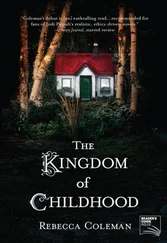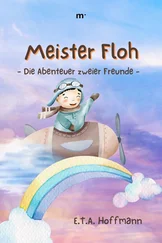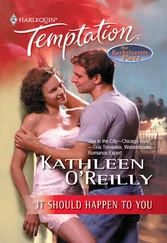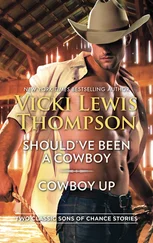We worked all morning. Around eleven, Dodge drove off to buy lunch, and a few minutes later Elias wandered outside for a break, obviously pleased to be free of his brother-in-law for half an hour. He walked out to the mailbox that stood at the edge of the road and leaned against it with his back to us, smoking and looking at the mountains. His shorts and sneakers were spattered with paint, and dabs of it spotted his hands and his forearms, obscuring the shapes of his tattoos. For once, he looked at ease.
“You been talking to Elias much?” Scooter asked me, low voiced. He had worked his way over to where I sat painting a section of lattice, and now hovered above me painting a support beam. I looked up at him, squinting at the light.
“Sometimes,” I said. “He’s not very talkative when other people are around.”
Scooter nodded. “He tell you anything about how he’s doing? Or what’s going on?”
“What do you mean, ‘what’s going on’?”
“In his head, I mean. If he’s getting any better.” I didn’t reply right away, and Scooter tossed his cigarette into a bush with a grudging sigh. “I took him to the doctor a while back. He hasn’t said anything to me about whether any of it is working.”
“I didn’t realize you were that close with him.”
“I’m not, exactly. He used to give me rides to the bus stop all the time, when I was in middle school. It was almost two miles. He’d see me walking up the side of the road and pick me up in the van. Practically every day.” He gestured toward the road, pointing north. “My grandparents live in the senior care home now, but we used to live down that way, near the turnoff. They raised me.”
“That was sweet.”
“Yeah, it was really cool of him. Especially in the winter. I never forgot it. After he got back from the Middle East, when he saw I was working for Dodge, he asked me who my tattoo guy was, so I took him out to the shop and introduced them. This was maybe three weeks after he got back. The next week he wanted me to take him there again, and the one after that. I felt weird about it, but I didn’t really want to say no. I mean, I can’t tell this guy what to do, even though the tattoo-a-week program feels strange to me. That and the fact he wouldn’t drive his own car.”
I set down the brush and shielded my eyes with my hand so I could watch him as he spoke. “So what did you do?”
“I just tried to get him talking. Asked him what the new tattoos stood for, whether he was frustrated with living in Frasier, stuff like that. I kept telling him I owed him for all those rides and I’d take him anywhere if he ever needed me to drive. And then one week he asked if I’d mind driving him to the doctor. It was a huge relief for him to ask. I was starting to get real worried he’d do something bad to himself. He had that vibe, you know? Like right before a kid sweeps his hand across the Chutes and Ladders board and knocks all the pieces on the floor. Spring-tight.”
I looked through the lattice at Elias. He seemed unaware that we were talking about him, and even on his best days he had a habit of cocking his left ear toward whoever was speaking. He looked watchful, eyeing the road, but if he was anxious or tense I couldn’t tell. Whatever was going on with him lived inside his mind, and there it stayed.
“If you could maybe talk to him,” said Scooter. “Try to suss out if he’s doing any better. He never wants to go anyplace anymore, so I hardly talk to him. Dodge thinks he just needs to work, and Cade—well, I don’t really know Cade. And I wouldn’t feel right going to him and telling him how to look after his own brother.”
“I’ll see what I can do. He seems to trust me.”
Scooter nodded and gazed toward him. “Thanks. Probably he’s fine now, but I gotta ask. There aren’t enough decent people out there as it is.”
“Too true,” I said, and he shot me a halfhearted smile before taking up his trim brush again and retreating into his deferential silence.
* * *
The chickens hadn’t come out as they were supposed to. Once the chicks in the porch incubator hatched from their neat little circle of eggs, Candy was indignant. The Vogels, who had traded them to Candy, had told her they were Rhode Island Whites—standard white chickens with a red comb, the kind from cartoons and Corn Flakes boxes. But almost as soon as they had hatched, it was clear that some were not like the others. They came out with a fine ash-colored sheen across their backs, and at six weeks some were heather-gray all over, while others—the males—kept the color on their necks and tail feathers even as their backs and bodies whitened. They were Brahmas, I could see, and Candy was annoyed. Despite their beauty, she felt swindled. She had been promised Rhode Island Whites, same as all the others.
As soon as they reached the age where they could be sexed, she wasted no time in separating the male chicks from the females. On the morning when I saw her in the poultry yard rounding them up into a tall-sided box, I felt sorry, but I knew she would care nothing for the pleas of a city girl who thought the roosters too beautiful to kill. They weren’t needed, and so they had to die.
On that morning, when the back door slammed, Candy came in from the yard carrying a cardboard box with half a dozen chicks in it. She set it on the table and got started filling up her mop bucket with water from the sink. Her youngest boy, John, peered over the edge of the box and made clucking noises. He reached in and scooped up one of the chicks, holding it to his chest. I looked from the boys to the bucket and then at Candy. I asked, “You want me to take the kids outside?”
“No, no. They’re farm kids. They know how it is.”
John was holding the little white chick right up to his face, almost beak to mouth, and making kissing noises at it. Even for a farm kid, I thought he was a little young to watch his mother drown small animals. I knew Candy’s choice wasn’t unusual, but it wasn’t strictly necessary either, especially when we were dealing with only a few. I decided to try my one idea that might resound with her.
“You don’t have to kill them,” I told her. “You can castrate them and raise them for meat.”
She chuckled and turned off the water. “If I knew how to castrate a rooster, maybe.”
“I do.”
She stopped in the middle of moving the bucket closer to the table and looked at me distrustfully. I continued, “I learned to do it at the camp I worked at. It’s not difficult. Then you can raise them alongside the hens and they don’t compete with the rooster. They’re called capons. The meat’s really good. It’s expensive, too. A gourmet thing.”
She laughed again. “Gourmet chickens.”
“I can do it in no time.”
Matthew, who had been circling the table as though looking forward to the spectacle of his mother drowning the chicks, looked from me to Candy. “Well, okay,” Candy said. “If you kill them by accident, who cares.”
The conditions weren’t ideal, but I gathered up the supplies I needed and got started. I tried to shoo the boys away, yet they were all rapt at the idea I was going to cut into living birds, and Candy did nothing to discourage them. I was fairly adept at the process. Halfway through, Dodge walked in. He took one look at the bloody towels on the kitchen table, the stunned chicks and his gawking sons, and asked, “Now, what in the blue hell is Jill doing?”
“She’s deballing the chicks,” offered Candy.
Dodge leaned over my shoulder, close enough that I could smell him. He was the only man who lived here, not counting Cade, who didn’t smoke. Dodge smelled of sweat and light cologne and the leather seats of his SUV. The overall effect was a weird combination of manual labor and vanity.
Читать дальше












